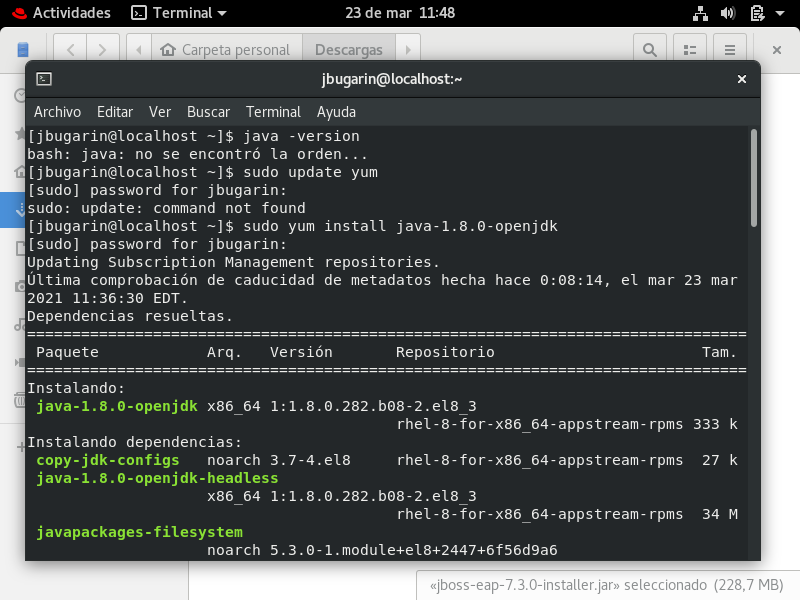

- REDHAT OPENJDK UPDATE
- REDHAT OPENJDK ARCHIVE
- REDHAT OPENJDK SOFTWARE
- REDHAT OPENJDK CODE
- REDHAT OPENJDK DOWNLOAD
Join us if you’re a developer, software engineer, web designer, front-end designer, UX designer, computer scientist, architect, tester, product manager, project manager or team lead. The problem solvers who create careers with code. In release OpenJDK 8.0.LinkedIn YouTube Twitter Facebook Products The .local.port property works in the same way as the existing properties for configuring the remote access port ( .port) and the Remote Method Invocation (RMI) port ( .rmi.port).Ĭertigna (Dhimyotis) root certificate authority (CA) certificate added In previous releases,OpenJDK selected this local port at random, which could lead to port collisions. In release OpenJDK 8.0.372, you can configure a local access port for remote JMX connections by setting the .local.port property. Without this enhancement, when running on a cgroup v2 Linux host system, OpenJDK would have used the underlying hosts' resource limits instead of applying container resource limits.Ĭonfiguration of third port for remote Java Management Extensions (JMX) OpenJDK is one of many Java Development Kits (JDKs) supported in Red Hat Enterprise Linux for use with JBoss enterprise products. The updates and support for Red Hat OpenJDK require a. Red Had provides OpenJDK builds for RHEL and Windows. Now, from OpenJDK 8.0.372 onward, OpenJDK detects both versions of the underlying cgroups pseudo file-system and applies corresponding container limits to the OpenJDK runtime. SAP is also one of the biggest external contributors to the OpenJDK project. The openjdk guys try hard to remove residual java-isms and use the same conventions as other system apps pure openjdk is more forward facing.
REDHAT OPENJDK CODE
Previously, from OpenJDK release 8u202 onward, the container detection code recognized cgroup v1 (legacy) host Linux systems only. Red Hat java is based on the openjdk only pure openjdk is better integrated with the system.
REDHAT OPENJDK UPDATE
This update enables the detection of cgroup v2 host systems when running OpenJDK within a Linux container. The OpenJDK 8.0.372 release includes an update to the HotSpot runtime code and the core libraries code in the JDK. Review the following release notes to understand new features and feature enhancements that the OpenJDK 8.0.372 release provides:ĭetection of control group (cgroup) v2 host systems in Linux containers Red Hat OpenJDK on Microsoft Windows uses the latest available CA certificate from RHEL.įor all the other changes and security fixes, see OpenJDK 8u372 Released.

Red Hat OpenJDK on Microsoft Windows includes the latest available timezone data from RHEL. Red Hat OpenJDK on RHEL uses system-wide CA certificates. Red Hat OpenJDK on RHEL uses system-wide timezone data files as a source for timezone information. Supported platforms include Linux, macOS. To use OpenJDK 11 with Red Hat Developer Studio, follow the Red Hat Developer Studio instructions.
REDHAT OPENJDK DOWNLOAD
The src.zip file includes the source for all the JAR libraries shipped with OpenJDK. AdoptOpenJDK provides prebuilt OpenJDK binaries from a fully open source set of build scripts and infrastructure. Windows Installation Download OpenJDK here. This change does not apply to OpenJDK builds for Microsoft Windows. RHEL also dynamically links against Harfbuzz and Freetype for font rendering and management.
REDHAT OPENJDK ARCHIVE
Red Hat OpenJDK on RHEL dynamically links against native libraries such as zlib for archive format support and libjpeg-turbo, libpng, and giflib for image support. You can set different security profiles to balance safety and compatibility. These configuration components are used by the Transport Layer Security (TLS) encryption protocol, the certificate path validation, and any signed JARs. Red Hat OpenJDK 8 obtains the list of enabled cryptographic algorithms and key size constraints from the RHEL system configuration. This change does not apply to OpenJDK builds for Microsoft Windows.Ĭryptographic policy support.

Note that Red Hat only provides OpenJDK-based Java 8 and 11 images. As an OpenJDK Project, OpenJFX shares much of its principles and infrastructure. If you are using Red Hat Middleware, the s2i images shipped are also useful to deploy, for example, on Red Hat Openshift Container Platform. This release proves there is a great future for client-side Java development. Over the next few years, the major components of the Java Platform were released as free and open. At JavaOne 2006, Sun announced that Java and the core Java Platform would be open sourced. Red Hat OpenJDK 8 automatically detects whether RHEL is in FIPS mode and automatically configures OpenJDK 8 to operate in that mode. Red Hat ships and supports container images with OpenJDK for both Java 8 and 11. OpenJDK started as a free and open source implementation of the Java Platform, Standard Edition, as a result of a 2006 initiative by Sun Microsystems.


 0 kommentar(er)
0 kommentar(er)
